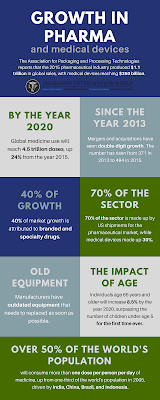Growth in Pharma and Medical Devices Industries

The pharma and medical device industries have experienced unprecedented changes for the last 10 years due to the overall demand of their products in the healthcare industry. As the market for their products continues to evolve, manufactures from both companies have faced a great challenge. They have to adjust to a new and open environment and also need forward thinking to help maintain an innovative edge. According to recent studies, the growth of the pharma andmedical device industries has been influenced by several factors. Among the top five include personalized care, increased consumer demand, increased use of outside contract services, collaboration of the two industries and tightened government regulation on drugs and medical devices. The factors are discussed in details below: 5 Trends that have led to the Growth in Pharma and Medical Device Industries Increasing Government Regulations The increase in government regulations has impacted pharmaceutical and med





